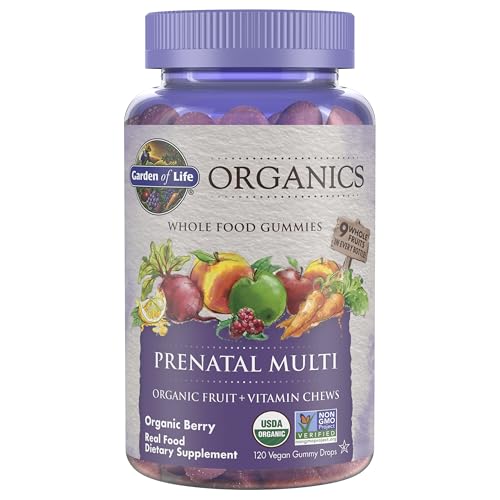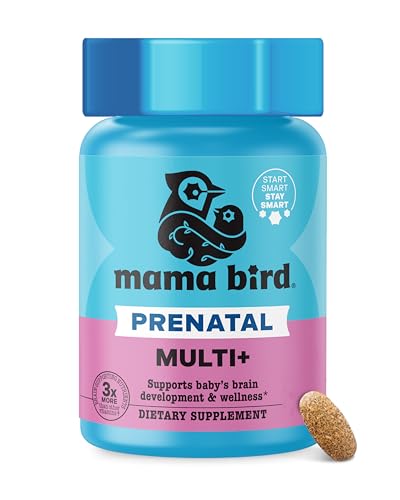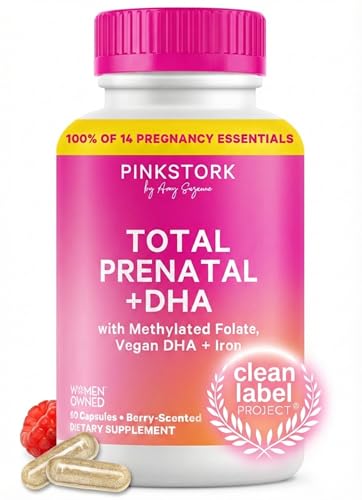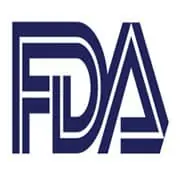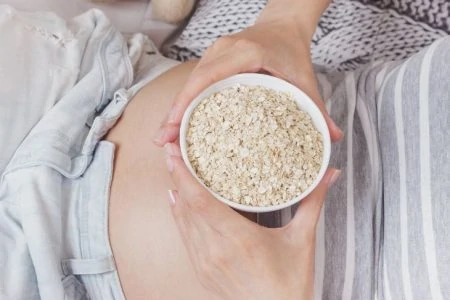Walking down the vitamin aisle can feel like taking a pop quiz you didn’t study for. With hundreds of bottles promising a “perfect” pregnancy, how do you actually choose? We researched the science and scoured the labels so you don’t have to.
We analyzed ingredients, absorption rates, and customer feedback to find the best prenatal vitamins available over the counter. These picks are designed to cover your nutritional bases, support your baby’s development, and help you feel your best while you do the hard work of growing a tiny human.
- No artificial sweeteners or preservatives
- Affordable
- Well-rounded nutrition
- Made from quality ingredients
- Won’t upset your stomach
- Whole-food vitamin
- Can be taken on an empty stomach
- Kosher, non-GMO and gluten-free
- Tested for pesticide residues
- Easy-to-chew gummies
- Made from 9 organic fruits
- Easy on the stomach
- Taken on an empty stomach
- With naturally occurring folate
- Includes ginger to ease nausea
- High amount of natural folate
- Contains natural B12
- Whole food sources
- No dreaded “fish burps”
- Easy-to-swallow softgels
- Affordable
- Easy to open one-handed
- Made in America
- Good for mom and baby
The Different Types of Prenatal Vitamins
Building a baby is exhausting. Your growing child relies exclusively on your body for support, so hitting your nutrient goals is non-negotiable. While a balanced diet is the best foundation, most of us need a little backup to ensure we tick every box.
Your doctor might prescribe a specific prenatal if you have unique health needs. However, if you are generally healthy, you can find excellent options over the counter.
Generally, you will choose between two main categories:
Synthetic Vitamins
You see these everywhere, from big-box stores to local pharmacies. They are the standard choice for moms who want a reliable, affordable option without needing a chemistry degree to decipher the label. Many synthetic options offer impressive ingredient lists.
These vitamins are isolated nutrients manufactured in a lab. They come as pills, powders, capsules, or liquids. While “synthetic” sounds scary to some, these are chemically designed to mimic natural vitamins. However, quality varies, and some cheap fillers can be harder for your body to absorb.
Pros
- Convenience: Usually a “one and done” daily pill.
- Cost-effective: generally cheaper than whole-food options.
- Potency: Easy to pack high doses into small pills.
- Availability: You can find them almost anywhere.
Cons
- Quality control: Standards vary wildly between brands.
- Absorption: Some isolated nutrients are harder to digest than those found in food.
Food-Based Vitamins
Many moms prefer a natural approach during pregnancy. It can feel counterintuitive to eat organic whole foods all day and then pop a lab-created pill.
Food-based vitamins are derived from concentrated real foods. The idea is that when you eat a carrot, you don’t just get Vitamin A; you get enzymes and cofactors that help your body use that Vitamin A. Food-based supplements aim to replicate this synergy for better absorption and gentler digestion.
Pros
- Digestion: Generally easier on the stomach.
- Safety: Lower risk of toxicity since doses mimic natural food intake.
- Quality: Often held to stricter manufacturing standards.
- Completeness: Likely to include trace minerals missing from synthetics.
Cons
- Price: Significantly more expensive to manufacture and buy.
- Pill count: You often need to take multiple large pills per day to get the required dosage.
What to Look for in the Best Prenatal Vitamins
Prenatal vitamins are packed with nutrients, but a few heavy hitters matter most. If your multivitamin lacks these, you may need to supplement separately.
Here are the essential components to check for on the label:
- Folic Acid (600 mcg): This is the big one. Folic acid (or folate) is crucial for preventing neural tube defects. You need this early, ideally before you even know you are pregnant (source).
- Iron (27 mg): Your blood volume increases dramatically during pregnancy to support the baby. You need extra iron to make hemoglobin and transport oxygen. Low iron can lead to anemia and severe fatigue (1).
- Calcium (1,000 mg total): Your baby will take what they need for their bones from your bones if you don’t provide enough. Most pills contain 150-300mg, assuming you get the rest from your diet (2).
- Iodine (150-220 mcg): Essential for your baby’s thyroid, brain, and nervous system development. Many women are surprisingly deficient in this (3).
- DHA (200 mg): An Omega-3 fatty acid vital for brain and eye development. Many standard prenatals skip this, so check if you need a separate softgel.
Other important support players include:
- Vitamin B6 (1.9 mg): Famous for helping curb morning sickness and supporting your baby’s brain development.
- Vitamin B12 (2.6 mcg): Works with folic acid to prevent birth defects and supports the central nervous system.
- Vitamin C (80-85 mg): Boosts your immune system and helps you absorb that all-important iron (4).
- Vitamin D (600 IU): critical for bone health and immune function. If you live in a cloudy climate, this is especially important.
- Choline (450 mg): A trending nutrient that is vital for brain development, often overlooked in older formulations.
- Zinc (11 mg): Supports the immune system and cell division.
Product Reviews
We evaluated ingredient quality, ease of swallowing, and nutrient profiles to bring you these top 10 recommendations.
Rainbow Light Prenatal One Multivitamin
Best Once-a-Day Prenatal Vitamin
If you struggle to remember multiple doses throughout the day, the Rainbow Light Prenatal One is a lifesaver. As the name suggests, it packs everything into a single daily tablet. It uses a base of superfood extracts, blending the convenience of a synthetic with the benefits of plant-based nutrients.
Iron supplements are notorious for causing stomach issues, but this brand uses iron amino acid chelate. This form is generally gentler on the digestive tract and less likely to cause constipation. It also covers your bases with choline, probiotics, and a citrus bioflavonoid complex.
For moms with dietary restrictions, this is a clean choice. It contains no wheat, gluten, dairy, nuts, soy, shellfish, or yeast. Plus, it is free from artificial sweeteners and colors.
Product Specs
Nutrition Label
| Folic Acid | 600 mcg DFE |
| Iron | 27 mg |
| Calcium | 50 mg |
| Iodine | 290 mcg |
Our Ratings
Pros
- Convenience: Just one pill a day.
- Budget-friendly: Good value per serving.
- Profile: Solid coverage of the main nutrients.
Cons
- Missing DHA: You will need a separate supplement.
- Low Calcium: Only 50mg, so eat your yogurt.
- Size: The tablet is on the larger side.
New Chapter Perfect Prenatal Vitamins
Best Organic Prenatal Vitamin
New Chapter is a favorite for health-conscious moms willing to pay a bit more for quality. The standout feature here is fermentation. The vitamins are fermented with probiotics and whole foods, making them incredibly easy to digest. You can even take them on an empty stomach without feeling queasy.
These are made with organic, non-GMO ingredients. It is a fantastic option if you prioritize whole-food sources over lab-created isolates.
Note for allergy sufferers: this product contains fermented soy and fermented wheat (as part of the brewing media). However, it is certified gluten-free, vegetarian, and sugar-free.
Product Specs
Nutrition Label
| Folate | 600 mcg DFE |
| Iron | 27 mg |
| Calcium | 75 mg |
| Iodine | 150 mcg |
Our Ratings
Pros
- Gentle: Formulated to be non-constipating and nausea-free.
- Quality: Organic, whole-food ingredients.
- Versatile: Great for conception through nursing.
Cons
- Cost: Definitely on the higher end.
- Dosage: You must take three tablets daily.
- Gaps: No DHA and low calcium content.
Megafood Prenatal and Postnatal Supplement
Best Whole Food Prenatal Vitamin
MegaFood is obsessed with keeping things real. Their supplements are made from actual food sources, like broccoli, carrots, and oranges. They bind their minerals to yeast to mimic how nutrients appear in nature.
This brand is also a Certified B Corporation, meaning they meet high standards for social and environmental performance. If ethical consumption matters to you, this is a brand you can feel good about buying.
Product Specs
Nutrition Label
| Folate | 600 mcg DFE |
| Iron | 18 mg |
| Calcium | N/A |
| Iodine | 150 mcg |
Our Ratings
Pros
- Digestion: Safe to take on an empty stomach.
- Clean: Non-GMO, Kosher, and tested for herbicides.
- Choline: Includes this vital brain nutrient.
Cons
- Schedule: Requires two tablets per day.
- Size: The pills are quite large.
- Yeast: Contains yeast, which some may wish to avoid.
Garden of Life Organics Prenatal Chew Gummies
Best Gummy Prenatal Vitamin
Let’s be honest: sometimes swallowing a horse pill while nauseous is impossible. Enter the gummy. Garden of Life offers a certified organic, berry-flavored chew that tastes like candy but works like a vitamin.
Unlike many gummies that use synthetic folate, this one provides folate from organic lemon peel. It is a fantastic option for women who cannot tolerate traditional tablets.
However, there is a trade-off. Gummies rarely contain iron because it tastes terrible in chewable form. You will need to get your iron from food or a separate pill.
Product Specs
Nutrition Label
| Folate | 600 mcg DFE |
| Iron | None |
| Calcium | None |
| Iodine | None |
Our Ratings
Pros
- Taste: Great flavor makes them easy to take.
- Clean: Organic and vegan.
- Gentle: Very easy on the stomach.
Cons
- Missing Nutrients: No iron, calcium, or iodine.
- Sugar: Gummies can stick to teeth and contain sugar.
- Texture: Can get sticky if stored in warm areas.
Garden of Life Vitamin Code Prenatal Vitamin
Best Prenatal Vitamin With Probiotics
Vitamin Code is designed to be “raw,” meaning the ingredients haven’t been treated with high heat that can destroy active enzymes. It includes a blend of 23 organically grown fruits and veggies, plus live probiotics to support your digestion and immune system.
The inclusion of ginger is a thoughtful touch for moms battling morning sickness. Because the nutrients come from raw food sources, they are generally well-tolerated.
It is free from synthetic binders and fillers. The iron is whole-food derived, which should help you avoid the dreaded constipation associated with cheaper iron salts.
Product Specs
Nutrition Label
| Folate | 800 mcg DFE |
| Iron | 18 mg |
| Calcium | 125 mg |
| Iodine | 150 mcg |
Our Ratings
Pros
- Absorption: Raw nutrients are bio-available.
- Gut Health: Contains probiotics and ginger.
- Purity: Non-GMO and clean ingredients.
Cons
- Dosing: Requires three capsules daily.
- Price: More expensive per serving.
- Missing: No DHA included.
DEVA Prenatal Vitamins One Daily
Best Vegan Prenatal Vitamin
The DEVA One Daily is a wallet-friendly savior for vegan moms. It is comprehensive, affordable, and completely free of animal products.
Unlike many budget brands, DEVA manages to pack a lot into one pill, including a small amount of vitamin B12, which is critical for vegans. The formula relies on plant sources and avoids artificial preservatives and colors.
It covers the basics well, including a decent amount of iron. However, the iron form can be strong, so take this one with a meal to avoid nausea.
Product Specs
Nutrition Label
| Folic Acid | 550 mcg |
| Iron | 21 mg |
| Calcium | 100 mg |
| Iodine | 150 mcg |
Our Ratings
Pros
- Value: extremely affordable.
- Ease: One tablet per day.
- Ethical: Certified vegan.
Cons
- Quality issues: Some users report spotting on pills over time due to moisture.
- Nausea: Can be harsh on an empty stomach.
- Herbs: Contains herbal blends (like chamomile) that some prefer to limit.
Mama Bird Prenatal Vitamin
Best Vegan Prenatal Vitamin with Natural B12
Mama Bird focuses on methylated vitamins. This is a huge plus for women who have the MTHFR gene mutation, which makes processing synthetic folic acid difficult. This formula uses Methylfolate and Methylcobalamin (B12) for maximum absorption.
It also includes a digestive enzyme blend and probiotics to keep things moving smoothly. While it lacks DHA, it provides a very high-quality base multivitamin that is easy to pair with a separate algae oil or fish oil supplement.
Product Specs
Nutrition Label
| Folate | 800 mcg DFE |
| Iron | 18 mg |
| Calcium | 100 mg |
| Iodine | 150 mcg |
Our Ratings
Pros
- Methylated: Contains active forms of Folate and B12.
- Gentle: Probiotics aid digestion.
- Vegan: Free from animal products.
Cons
- Incomplete: No DHA included.
- Calcium: Low content; requires dietary supplementation.
- Size: Pills are on the larger side.
Spectrum Essentials Prenatal DHA
Best DHA Prenatal Supplement
This is not a multivitamin; it is a specialized DHA supplement designed to pair with your daily vitamin. DHA is crucial for fetal brain and eye development, but getting enough from diet alone is tough.
Spectrum Essentials uses non-fish oil sources (algae-based) or highly purified fish oil to avoid ocean contaminants like mercury. This makes it a safer bet than generic fish oil capsules.
Product Specs
Nutrition Label
| Omega-3 fatty acids | 240 mg |
| DHA | 200 mg |
Our Ratings
Pros
- No Burps: Designed to minimize fishy aftertaste.
- Pure: Mercury-free and safe for pregnancy.
- Targeted: Fills the DHA gap perfectly.
Cons
- Freshness: Check dates carefully; natural oils can go rancid.
- Add-on only: Must be taken with a separate multivitamin.
- Smell: Some users still detect a marine scent.
Pink Stork Total Prenatal Vitamins
Best for Before, During and After Pregnancy
Pink Stork is a women-owned brand that gets it. The “Total Prenatal” is designed to be your go-to from the moment you start trying to conceive until you are done breastfeeding.
It is doctor-formulated and boasts clean ingredients, no gluten, dairy, soy, or GMOs. The formula includes a solid dose of iron and folate, plus biotin for your skin and nails, which can take a beating during pregnancy.
The bottle features a heart-shaped design and a flip-top lid, which sounds trivial until you are trying to open vitamins with one hand while holding a newborn.
Product Specs
Nutrition Label
| Folate | 600 mcg DFE |
| Iron | 27 mg |
| Calcium | 195 mg |
| Iodine | 290 mcg |
Our Ratings
Pros
- Versatile: Supports fertility, pregnancy, and postpartum.
- Clean: Free from common allergens.
- Design: Easy-to-open packaging.
Cons
- Scent: The vitamin smell can be strong for some.
- Reactions: A small number of users report headaches.
Enfamom Prenatal Vitamins
Best Prenatal Vitamin with DHA
Enfamom comes from the makers of Enfamil formula, so they know a thing or two about baby nutrition. This softgel offers an impressive all-in-one profile.
You get high iron, high calcium (relative to other brands), and appropriate folic acid levels. Crucially, it includes 200mg of DHA. If you hate juggling multiple bottles or researching combinations, this is the “easy button” for prenatal nutrition.
Product Specs
Nutrition Label
| Folate | 595 mcg DFE |
| Iron | 28 mg |
| Calcium | 250 mg |
| Iodine | 150 mcg |
Our Ratings
Pros
- Complete: Includes DHA, so no second pill needed.
- Potent: High iron and calcium levels.
- No Nasties: Free from artificial flavors and sugar.
Cons
- Size: The softgel is quite large.
- Cost: Can be pricier than basic generics.
When Should I Start Taking a Prenatal Vitamin?
Ideally, you should start taking them before you conceive. Experts recommend starting at least one to three months prior to trying for a baby.
Why the rush? The baby’s neural tube (which becomes the brain and spine) develops in the first month of pregnancy, often before you even get a positive test result. Having Folic Acid in your system during this window is the single best way to prevent spina bifida (5).
What Time of Day Should I Take Prenatal Vitamins?
The “best” time is simply whenever you will remember to take it. Consistency beats perfect timing. However, your stomach might have a preference.
If you struggle with morning sickness, avoid taking them the moment you wake up. Taking your vitamin with a solid dinner or right before bed allows you to sleep through the initial digestion, which can minimize nausea. Always try to take them with food unless your specific brand says otherwise.
Do Prenatal Vitamins Have Side Effects?
Unfortunately, yes. While they are safe, high levels of nutrients can wreak havoc on a sensitive digestive system.
Common complaints include:
- Constipation: Iron is the usual culprit here. It slows down digestion. If you are backed up, increase your water and fiber intake, or ask your doctor about a stool softener.
- Dark Stools: Unabsorbed iron can turn your poop dark green or black. It looks alarming, but it is generally harmless (6).
- Nausea: A large, zinc-and-iron-packed pill hitting an empty stomach is a recipe for disaster. If you feel sick, switch to taking it with a meal or try a gummy version (just watch the iron content).
- Appetite Changes: Some moms report a metallic taste or a loss of appetite after taking their vitamins (7).
What About Other Issues?
You might also experience:
- Acne breakouts.
- Mild insomnia.
- Anxiety.
- Upset stomach.
It is tricky to blame the vitamin entirely because pregnancy itself causes all these symptoms too. Your hormones are fluctuating wildly, which causes acne and fatigue regardless of what supplements you take.
If a side effect becomes unmanageable, don’t just quit. Switch brands. A food-based vitamin or a gummy might solve the problem instantly.
How Do I Know Which Vitamin I Need the Most?
For most healthy women, a standard OTC prenatal is perfect. Look for the “Big 5”: Folic Acid, Iron, Calcium, Iodine, and DHA.
However, consult your doctor if:
- You follow a strict vegan diet (you may need extra B12).
- You have a history of anemia (you may need extra iron).
- You have had bariatric surgery (you may need higher absorption formulas).
- You are carrying multiples (twins demand more nutrients).




